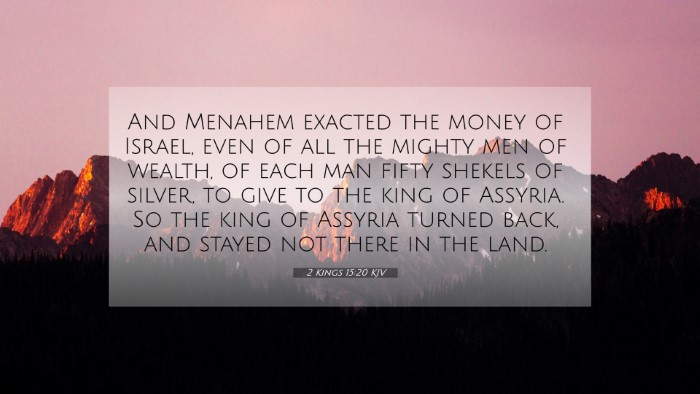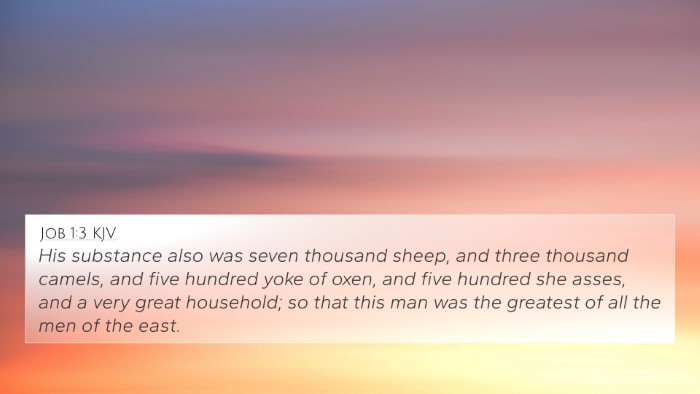2 Kings 15:20 - Summary and Interpretation
This verse refers to the economic policies of King Menahem during a time of national instability in Israel. Menahem's reign is characterized by a heavy taxation imposed on the wealthier citizens to ensure a supply of tribute to Assyria, indicating a pragmatic, albeit harsh, approach to governance.
Contextual Background:
In the broader context of 2 Kings 15, this chapter details the succession of kings in Israel and Judah, marking the moral and spiritual decay of the nation. It reflects the consequences of idolatry, political intrigue, and the looming threat from neighboring powers, specifically Assyria.
Interpretative Insights from Commentaries:
- Matthew Henry: He emphasizes that Menahem's approach—seeking to strengthen his rule through oppression—reflects a deeper moral failing. Henry notes that such leaders often resort to harsh measures for self-preservation rather than righteous governance, highlighting the theme of divine judgment on unrighteous rulers.
- Albert Barnes: Barnes provides a detailed analysis of the economic implications of Menahem’s policies, arguing that his heavy tax on the people was a necessary evil to maintain stability. He also suggests this practice ultimately reflects the desperate circumstances faced by the Israelites at the time.
- Adam Clarke: Clarke interprets this verse through the lens of prophecy and the fulfillment of divine judgment. He draws parallels between Menahem's actions and those of earlier kings, suggesting that economic policies driven by fear and oppression are counterproductive to the nation's well-being.
Thematic Connections:
This verse connects to several key themes in the Biblical narrative, such as:
- Divine Judgment: The narrative indicates that God’s judgment often falls on nations that stray from righteous living. (See Isaiah 10:1-4)
- Leaders and their Accountability: The scriptures often illustrate the weight of leadership and the consequences of poor governance. (Refer to James 3:1)
- Economic Oppression: This theme is prevalent, pointing to the danger of exploiting the populace for political gain. (Cross-reference Proverbs 28:3)
- Trust in God over Material Wealth: The reliance on material wealth, seen in Menahem's choices, serves as a caution. (Matthew 6:24)
- Political Intrigue and Unrest: The difficulty of maintaining peace and order amidst corruption is echoed throughout the Old Testament (See Ecclesiastes 5:8)
- Repentance and Restoration: While the leaders falter, the hope of redemption is repeatedly presented. (Complementary verse: 2 Chronicles 7:14)
- Taxation and Societal Impact: The burdens imposed by rulers affect societal structures, suggesting the need for fair leadership. (Reference Luke 20:25)
Bible Verse Cross-References:
- Isaiah 10:1-4 – Discusses divine judgment against oppressive leaders.
- James 3:1 – Warns about the responsibility of teachers and leaders in faith.
- Proverbs 28:3 – Critiques those who exploit the poor for gain.
- Matthew 6:24 – Advises against serving both God and wealth.
- Ecclesiastes 5:8 – Comments on the realities of corruption in governance.
- 2 Chronicles 7:14 – Calls for humility and turning back to God for healing.
- Luke 20:25 – Teaches about the ethics of paying taxes.
- Jeremiah 22:15-16 – Illustrates the qualities of a just ruler.
- Micah 6:8 – Encourages just living as a requirement from God.
Conclusion:
The interpretation of 2 Kings 15:20 reflects the complexity of biblical themes surrounding leadership accountability, divine judgment, and the precarious balance of power. Understanding this verse in light of the provided cross-references highlights its place within the larger narrative of scripture, emphasizing both the continuity of God's justice and the call for righteous governance among His people.









